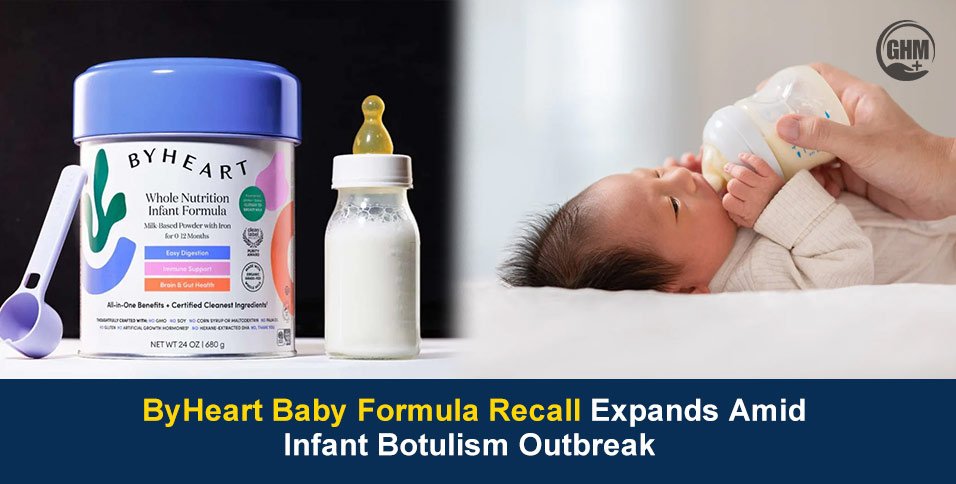Recently, the ByHeart baby formula recall took place amid an infant botulism incidence in the United States.
The Food & Drug Administration (FDA) has issued a nationwide recall of all lots of ByHeart Whole Nutrition Infant Formula after a multi-state Infant botulism outbreak. ByHeart then voluntarily recalled all its baby formula lots as the botulism risks started growing.
It now carries implications for caregivers, healthcare professionals, policymakers and the global health community.
The ByHeart Baby Formula Recall
The ByHeart baby formula recall was announced after the Centres for Disease Control and Prevention (CDC) and other public-health partners identified at least 15 infants in 12 states who consumed ByHeart formula and developed suspected or confirmed infant botulism.
The recall covers all unexpired lots of ByHeart Whole Nutrition Infant Formula, including canned 24-oz tubs and single-serve “Anywhere Pack” sticks.
The outbreak investigation is ongoing. While no unopened cans have yet been confirmed positive for the bacteria, an opened can of the product did test positive for spores of Clostridium botulinum, the pathogen that causes botulism.
Understanding Infant Botulism
Infant botulism is a rare illness in babies with severe consequences. It occurs when C. botulinum spores are ingested, colonise the infant’s gut (which is still immature) and produce neurotoxins that affect nerve and muscle function.
Because infants rely heavily on formula as their sole or primary source of nutrition, any contamination risk is especially urgent.
The recall highlights a concern not only for parents but also for healthcare providers and regulators. A brand like ByHeart, with a small market share (1 % of U.S. infant‐formula sales), can cause a significant public health event due to the population’s vulnerability.
Key details of Formula Recall
What products are included
All ByHeart Whole Nutrition Infant Formula lots, including cans and single-serve sticks, are sold online and in major retail stores across the U.S.
The recall applies to unexpired product currently in stores or homes.
Who is affected and when
As of November 10, 2025, 15 infants, aged approximately. 16-157 days, in 12 states, have suspected or confirmed infant botulism after exposure to ByHeart formula. All 15 were hospitalised, and no deaths were reported.
Illness onset dates were from August to early November 2025.
States include: Arizona, California, Illinois, Kentucky, Minnesota, New Jersey, North Carolina, Oregon, Pennsylvania, Rhode Island, Texas, and Washington.
Signs of infant botulism
Parents and caregivers should watch for:
- Constipation (often an early sign)
- Poor feeding or inability to suck/swallow
- Drooping eyelids, weak facial expression
- Loss of head control, generalised weakness
- Difficulty breathing (in severe cases)
What to do if you have a suspected product
If your infant consumed any ByHeart Whole Nutrition Infant Formula, stop use immediately and monitor for symptoms.
If you still possess the product, take a photo/record the lot number, label it “Do Not Use”, and sanitise any equipment that touched it.
Seek urgent medical care if your baby shows signs of infant botulism—early treatment improves outcomes.
What’s still under investigation
The exact point of contamination (manufacturing facility, packaging, handling) has not yet been confirmed by the FDA.
Although an opened can of ByHeart formula was found to contain C. botulinum spores, no unopened can from the broader recall has yet tested positive. That means causation remains under review.
No other infant-formula brands have been publicly implicated so far, but the investigation continues, and regulators are vigilant.
Broader Implications of Infant Formula Recall
From August through November 2025, about 84 infants nationwide were treated for infant botulism.
Of those infants, 36 (43 %) had exposure to powdered infant formula, and 15 (40 % of that subgroup) had consumed ByHeart formula, which is disproportionate given the brand’s small market share.
The event underscores how food-safety oversight, manufacturing controls and rapid regulatory action are vital even in specialised segments such as infant nutrition.
Policymakers and health-industry leaders may review the adequacy of testing protocols for powdered infant formula, particularly for rare but severe conditions like infant botulism.
Healthcare professionals, including paediatricians and neonatal care providers, should remain aware of this outbreak, update patient counselling, and ensure early diagnosis for suspected infant botulism.
Conclusion
The ByHeart baby formula recall is a significant alert for families, healthcare providers and the nutrition industry alike.
Though the number of affected infants remains relatively small, the severity of infant botulism and the vulnerability of infants make this event urgent.
By acting quickly, monitoring infants carefully, and taking necessary precautions, caregivers and professionals can play an important role in reducing risk while the investigation continues.













